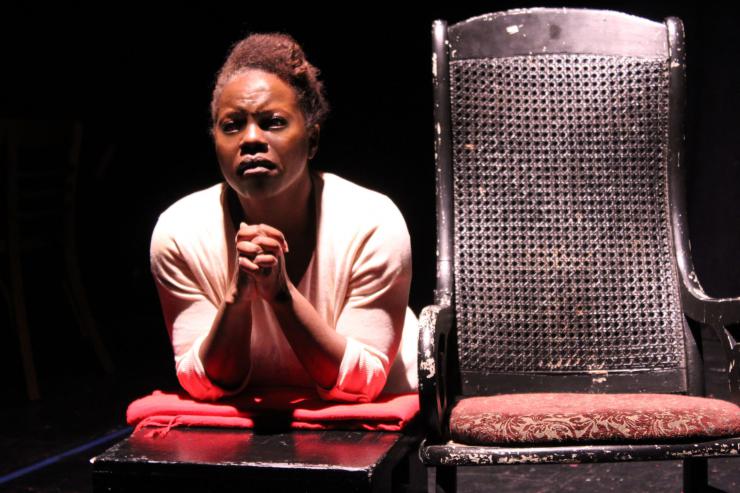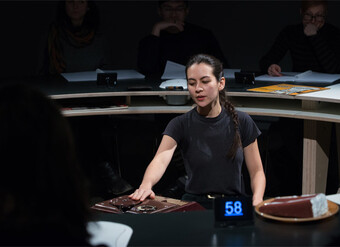Mary Speaks
From the Perspective of Black Mothers
In Viola Davis’ emotional 2017 Oscar speech for winning Best Supporting Actress for her role in the film adaptation of August Wilson’s Fences, she said:
You know, there is one place that all the people with the greatest potential are gathered and that’s the graveyard. People ask me all the time—what kind of stories do you want to tell, Viola? And I say exhume those bodies. Exhume those stories—the stories of the people who dreamed big and never saw those dreams to fruition, people who fell in love and lost.
In these few lines, she was able to articulate emotional, political, and historical density with such feeling and strength. She talked about honoring those who have fallen. To look to the literal and metaphoric dead who live in the graveyard, a place that is the repository of memories, either erased or forgotten. To exhume those bodies, those black bodies and their stories. To bring forth the memory of the people who dreamed big and never saw those dreams bear fruit. To inhabit the people who fell in love and lost.
The way that his [Mike Bown’s] body was left lying in the street for hours and how his mother wasn't allowed through, it just reminded me of the story of Mary and Jesus.—Angela Polite
Viola Davis’s powerful words and images spoken that evening conjure similar sentiments to those evoked in the one-woman play Mary Speaks created and performed by Angela Polite earlier this year at the Theater for the New City in New York City directed by Christopher Burris. Mary Speaks comes from that same impulse of exhuming the bodies and stories of the lost.
The play, with minimal design elements, and with only an accompanist to color the world Polite creates, begins with music reminiscent of church music. It sets the tone to this loose passion play and puts the audience in the middle of a spiritual guided by Polite. The play is set in Charleston and is told from the perspective a young Gullah girl named Mary who gives birth to “a special boy” under mysterious circumstances. From there, Polite uses her acting dexterity through voice and movement to change characters, points of view, and time shifts spanning several decades.
The play also features several songs that Polite composed as a response to the deaths of black men throughout American history. The final song is a response to the 2014 death of Eric Garner, and also expresses a mother’s grief, juxtaposing the death of Mary’s son Jesus with black corpses that trees bore during the lynching era and the bodies brutalized on the streets in the present:
A Savior on a cross
A Man swinging on a tree
A Dead boy on the street.
The final scene, not surprisingly, is a scene about the death of the son. We expect it from the moment the “special son” is born. A boy is at the wrong place at the wrong time. His hands are up, and then he is shot. Mary runs to her son, but she is unable to come close. This scene echoes the aftermath of Mike Brown’s death when he lay on the street, and his mother was unable to go to him.

In an email interview with playwright and performer Angela Polite, she said:
I recall a CNN interview where Mike Brown's mother was brought into a room and was greeted by the mothers of Trayvon Martin and Sean Bell. It was as if they were inviting her to be a part of a club. I can only imagine what was going through her mind at that time. My heart really hurt for her as I watched. As I was writing and researching, I began to familiarize myself with the details surrounding the deaths of all the unarmed black men, including Mike Brown. The details of the latter really stuck with me. The way that his body was left lying in the street for hours and how his mother wasn't allowed through, it just reminded me of the story of Mary and Jesus.
Mary Speaks began as a project assigned by Polite’s pastor, Reverend Henry A. Belin III of the First AME Bethel Church in Harlem to be performed for an Advent event. What started as a small project that repositioned Mary and Jesus embodying black folk soon expanded.
Rendering the image of Jesus and his mother Mary as black asserts that these divine figures are also part of the black canon. Because if humans are made in the image of the Lord, as the Bible states, then black communities need a black Jesus and a black Mary in order to feel that they too matter, and that they are represented.
What started as a small project that repositioned Mary and Jesus embodying black folk soon expanded.
The representation of a black Mary is, of course, an extension of the black mother, and who, as the mother of a son, has more at risk, more to lose. Polite taps into that collective grief as she plays each mother from time period to time period because it is a grief that exists close to home. In her essay “The Condition of Black Life Is One of Mourning,” the poet Claudia Rankine opens by talking about one of her friends who recently gave birth and jokes about moving to another country before her son was born. Rankine asks another friend what it’s like being the mother of a black son. Her friend replies bluntly: “The condition of black life is one of mourning.” Rankine writes:
For her, mourning lived in real time inside her and her son’s reality: At any moment she might lose her reason for living. Though the white liberal imagination likes to feel temporarily bad about black suffering, there really is no mode of empathy that can replicate the daily strain of knowing that as a black person you can be killed for simply being black: no hands in your pockets, no playing music, no sudden movements, no driving your car, no walking at night, no walking in the day, no turning onto this street, no entering this building, no standing your ground, no standing here, no standing there, no talking back, no playing with toy guns, no living while black.
The litany of things that a black person can be killed for while doing quotidian things that Rankine lists is something that every black parent thinks about. What does a mother say to her child? In Polite’s piece, the mothers hush the child: don’t stand out, don’t make a noise, don’t disturb everyone else or something bad will happen. On stage, as in life, something bad does happen, over and over. It is an American tragedy that the number of black corpses in public spaces seems normal. The deaths of Emmett Till, Trayvon Martin, Mike Brown, and countless other black sons is part of the black collective consciousness. They are lives whose potential live in the graveyard.
Angela Polite performs Mary Speaks in service to the fallen, whose bodies were thought unimportant, whose stories of people who dreamed big and never saw those dreams bear fruit.








Comments
The article is just the start of the conversation—we want to know what you think about this subject, too! HowlRound is a space for knowledge-sharing, and we welcome spirited, thoughtful, and on-topic dialogue. Find our full comments policy here